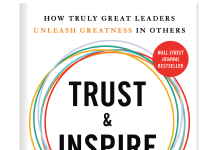The connection between change and stress is well-established, and with the unprecedented rate of change in the world and our workplaces, the pressures we face have soared. We know from neuroscience that stress creates tunnel vision, limiting our ability to see and consider all options and make the best decisions at precisely the time when we need this capacity most.
In this context, emotional intelligence (EQ) (defined here as the ability to understand, manage, and effectively express one’s own feelings, as well as engage and navigate successfully with those of others), is essential to effective leadership. Emotional intelligence builds leadership capability, promotes productivity, and creates better workplaces.
Self-Management
Self-awareness is the key to EQ: If leaders are unaware of how they are feeling, it is difficult, if not impossible, to accurately understand others and provide leadership direction. When angry, scared, or distressed, people reflexively become inward-focused as a protective measure. This makes leaders more subject to confirmation bias, which is the tendency to screen out information that doesn’t correspond to what we already believe to be true. Paul Simon described this tendency well in the song, “The Boxer”: “…a man hears what he wants to hear and disregards the rest.”
This protective reflex is a problem for leaders, but particularly so during times of change, when observation and agility are paramount to be effective. It is paradoxical that when leaders most need a degree of self-awareness, they are most likely to experience strong, counter-productive emotions.
To effectively manage negative emotions, so they don’t overwhelm and affect judgment, leaders need to avoid personalizing others’ behaviors to perceive them more accurately. Without self-awareness and reflection, leaders lack insights into why they make decisions, and insights into their strengths, development needs and blind spots. Such knowledge is a starting place for self-improvement.
A good metaphor here is what is referred to in the Emotional intelligence Toolkit as “Riding the Wild Horse:” taking control vs. being a passive rider
Since we all have blind spots, obtaining accurate feedback from others is important to foster self-awareness. Candid feedback is difficult to obtain, and it must be received without defensiveness to enable learning and insights.
In today’s high-pressure workplace, where “doing more with less” is the norm, it is not surprising that few leaders rarely pause to contemplate their own motivations and behavior.
Tailor Coaching Approach to Different Staff Needs
Developing employees’ transferable skills is now a key differentiator for employers, to mitigate reduced job security. To be an effective coach requires observation, insight, and empathy.
Leaders need to emphasize understanding vs. judgment when coaching staff, and balance an understanding of each employee’s strengths, development needs, and motivations.
According to recent research from Accenture, 95 percent of respondents today report that they need new skills. The same research revealed “ability to change and learn” and “judgment and decision-making” as key priorities for employees.
Provide Effective Feedback
Being skilled at delivering feedback effectively is related to emotional intelligence, enabling leaders to assess others and tailor the feedback so it can be “heard” as being helpful. This requires:
- Focusing on the behavior to be changed, not the personality
- Being specific so the individual know precisely what should be changed
- Being timely. Feedback ideally occurs just before an action so it can be applied (using the concept of “feedforward” as coined by Marshall Goldsmith) or as soon as possible after the action, so it doesn’t become distorted by memory
- Having positive intentions. People are much more receptive to receiving feedback if it is given in the spirit of being helpful.
Manage Stress to Lead Others
During times of stress, people typically revert to “tried-and-true” behaviors that are within their comfort zone when under stress, even though these may not be appropriate to the situation. Leaders need to increase awareness of their own “trigger points” and become sensitized to when they need to take a deep breath or a brisk walk, or speak with a trusted friend before immediately responding and potentially damaging relationships.
Moreover, stress can be contagious, and leaders should strive to be the face of calm when major changes are underway, so there is more room for thoughtful action.
EQ and Trust
Recent neuroscience research has provided evidence of the importance of trust in building positive workplaces. A recent Harvard Business Review article cited several factors for building trust, including:
- Creating positive relationships
- Sharing information broadly
- Providing recognition for excellence
- Developing whole person growth
All of these are fostered by emotional intelligence. Emotional intelligence helps build resilience and agility, which are critical in times of change. Leaders need EQ to develop their own capabilities and to foster them in others.
To learn more about this topic, attend Training magazine’s complimentary Webinar on June 6. Register today at: http://www.trainingmagnetwork.com/events/1091 #HRmanagement #effective leadership
Marjorie Derven is managing partner with HUDSON Research & Consulting, Inc. (www.hudsonrc.com), which designs and delivers strategic talent management and Diversity & Inclusion solutions, often within global virtual teams. Her firm has developed research-based custom global team training solutions. Derven is a senior fellow at The Conference Board.




